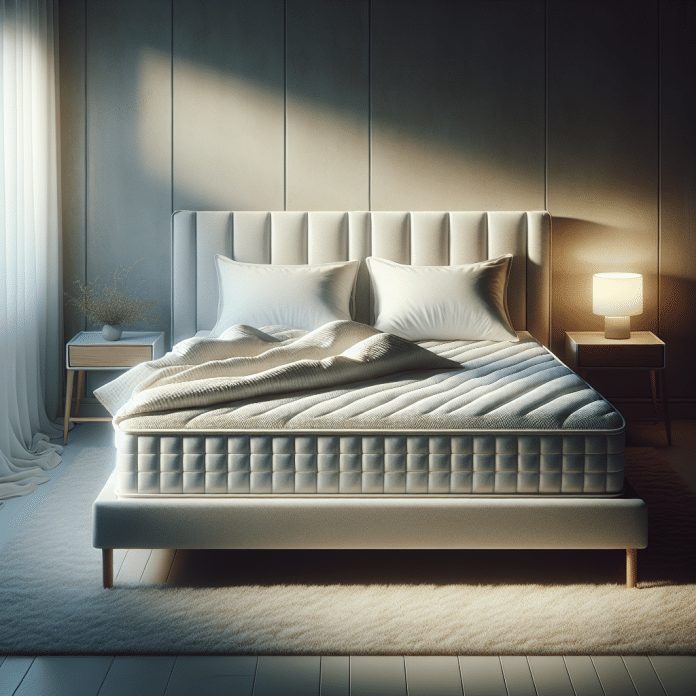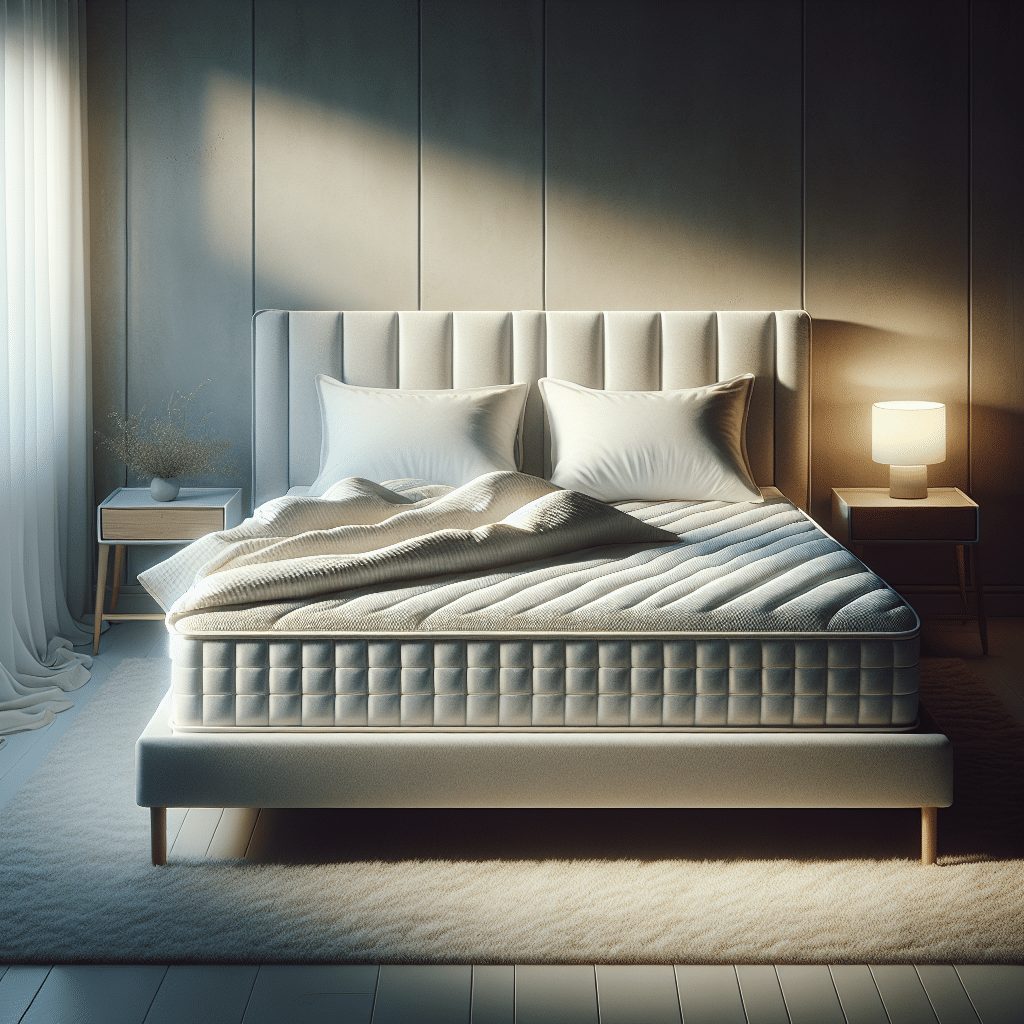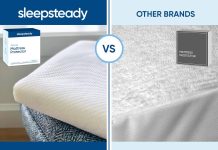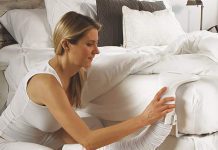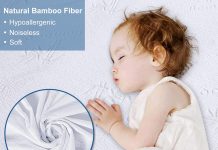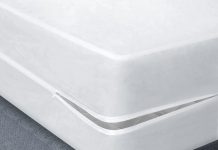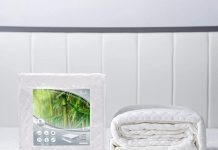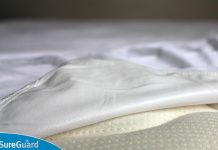Ready to protect your mattress but not sure what thickness of mattress protector to choose? Look no further! In this article, we will explore the ideal thickness of mattress protectors to help you make the right decision for a peaceful night’s sleep. From the thinnest to the thickest options available, we’ll discuss the benefits and considerations of each, ensuring you find the perfect fit for your needs. Don’t let mattress protection be a guessing game – let’s dive into the world of thickness and find your perfect match!
Review contents
Benefits of Using a Mattress Protector
Protection Against Stains
Using a mattress protector offers numerous benefits, and one of the most noticeable is protection against stains. No matter how careful we are, accidents can happen, and spills or bedwetting incidents can occur. A mattress protector acts as a barrier, preventing any liquids from penetrating into the mattress. This not only keeps your mattress clean and stain-free but also ensures that no unpleasant odors develop over time. With a mattress protector, you can relax and enjoy a worry-free sleep, knowing that your mattress is well-protected.
Protection Against Allergens
Another significant benefit of using a mattress protector is protection against allergens. Mattresses can be a breeding ground for dust mites, which are a common allergen for many people. Dust mites thrive in warm and humid environments, feeding on dead skin cells that accumulate on mattresses. By using a mattress protector, you create a barrier that keeps dust mites and their allergens at bay. This is particularly beneficial for individuals with allergies or asthma, as it helps to reduce symptoms and promote a healthier sleep environment.
Extending the Lifespan of the Mattress
Investing in a good-quality mattress is a significant financial decision. Therefore, it’s essential to take steps to protect and extend the lifespan of your mattress. A mattress protector acts as a shield, preventing any wear and tear that can occur from spills, sweat, or body oils. By keeping your mattress clean and free from damage, you can ensure that it lasts longer and maintains its original support and comfort. This not only saves you money in the long run but also allows you to enjoy a comfortable and supportive sleep surface for years to come.
Factors to Consider When Choosing Thickness
Mattress Type
When selecting the thickness of a mattress protector, it’s necessary to consider the type of mattress you have. Different mattress types have different requirements, and ensuring a proper fit is crucial for optimal protection. For example, thinner mattress protectors are generally more suitable for mattresses with a slim profile, such as memory foam or latex mattresses. Thicker mattress protectors, on the other hand, may be better suited for thicker mattresses, such as pillow-top or hybrid mattresses. Considering the thickness of your mattress will help you choose a protector that fits snugly and provides adequate coverage.
Personal Comfort Level
Comfort is a key factor when choosing a mattress protector, and the thickness plays a significant role in this aspect. Some individuals prefer a barely noticeable layer between themselves and the mattress, while others may appreciate a slightly thicker protector for added cushioning. Consider your personal comfort preferences when selecting the thickness of a mattress protector. If you are sensitive to changes in the feel of the mattress surface, opting for a thinner protector may be the best choice. However, if you enjoy a plush and cushioned sleep surface, a thicker mattress protector may be more suitable.
Climate
The climate in which you live can also influence the choice of mattress protector thickness. In warmer or more humid climates, breathability becomes essential to prevent overheating during sleep. Thicker mattress protectors may not allow for as much airflow as thinner ones, potentially leading to discomfort. On the other hand, in colder climates, a thicker mattress protector can provide extra insulation and warmth, creating a cozy sleep environment. Consider the climate you live in when deciding on the thickness of your mattress protector to ensure optimal comfort throughout the year.
Allergies and Sensitivity
If you suffer from allergies or have sensitivities to certain materials, the thickness of your mattress protector can play a role in your overall comfort. Thicker protectors may contain more layers or additional materials, which could potentially trigger or worsen allergies. In such cases, opting for a thinner protector made from hypoallergenic materials might be more suitable. It’s essential to consider any specific allergies or sensitivities you have when choosing a mattress protector, as it ensures that your sleep environment remains comfortable and irritation-free.
Different Thickness Options
Thin Mattress Protectors (0.5-1 inch)
Thin mattress protectors typically range from 0.5 to 1 inch in thickness. These protectors offer a minimal layer of protection while maintaining the natural feel of the mattress. They are often made from lightweight materials that are breathable and allow for adequate airflow. Thin mattress protectors are an excellent choice for individuals who want to preserve the original feel and comfort of their mattress while enjoying the benefits of protection. They are especially suitable for mattresses with a slim profile, such as memory foam or latex mattresses.
Advantages
One advantage of thin mattress protectors is that they do not significantly alter the feel or firmness of the mattress. They offer a subtle layer of protection without compromising on comfort. Thin protectors also tend to be more breathable, allowing for airflow and preventing overheating during sleep. This makes them an ideal option for individuals who live in warmer climates or those who tend to sleep hot.
Disadvantages
One potential disadvantage of thin mattress protectors is that they may not provide as much cushioning or padding as thicker options. If you prefer a more plush sleep surface or want to add extra cushioning to your mattress, a thin protector may not meet your preferences. Additionally, thin protectors may not be as effective at blocking allergens or stains compared to thicker options. If you prioritize maximum protection, especially against allergens or spills, a thicker mattress protector may be a more suitable choice.
Medium Thickness Mattress Protectors (1-2 inches)
Medium thickness mattress protectors fall in the range of 1 to 2 inches in thickness. These protectors offer a balance between protection and added cushioning. They provide a slightly plusher sleep surface compared to thin protectors while maintaining breathability and airflow. Medium thickness protectors work well for individuals who want some extra cushioning without completely altering the feel of their mattress.
Advantages
One advantage of medium thickness mattress protectors is the additional cushioning they provide. If you find your mattress to be too firm or want to enhance its comfort level, a medium thickness protector can be a great solution. These protectors offer a good balance between protection and added cushioning, ensuring a comfortable and supportive sleep surface. Additionally, medium thickness protectors often have the benefit of providing better protection against spills and allergens compared to thinner options.
Disadvantages
One potential disadvantage of medium thickness mattress protectors is that they may slightly alter the feel or firmness of the mattress. If you prefer a more minimalistic sleep surface, a medium thickness protector may add too much padding for your liking. Additionally, some medium thickness protectors may not be as breathable as thinner options, potentially leading to overheating in warmer climates. It’s essential to consider your comfort preferences and climate when deciding on the thickness of your mattress protector.
Thick Mattress Protectors (2-4 inches)
Thick mattress protectors are the thickest option available, typically ranging from 2 to 4 inches in thickness. These protectors offer the most significant amount of cushioning and padding, completely transforming the feel of the mattress. They are an excellent choice for individuals who prefer a plush sleep surface or want to add extra support to their mattress.
Advantages
One advantage of thick mattress protectors is the significant amount of cushioning they provide. If you find your mattress to be too firm or want to create a more luxurious sleep experience, a thick protector can offer the desired comfort. These protectors offer the most substantial level of padding and can completely alter the feel of your mattress. Additionally, thick protectors often offer superior protection against spills, allergens, and general wear and tear, ensuring your mattress stays in great condition for longer.
Disadvantages
One potential disadvantage of thick mattress protectors is that they may significantly change the feel and firmness of your mattress. If you prefer a firmer sleep surface or dislike the sensation of sinking into a plush mattress, a thick protector may not be the best choice for you. Additionally, thick protectors are generally less breathable than thinner options and may lead to overheating, especially in warmer climates. Consider your comfort preferences and climate when deciding on the thickness of your mattress protector.
Types of Materials Used
Cotton
Cotton mattress protectors are a popular choice due to their breathability and softness. Cotton is a natural material that allows for adequate airflow, keeping you cool and comfortable throughout the night. It is also hypoallergenic and suitable for individuals with allergies or sensitivities. Cotton mattress protectors are easy to clean and maintain, as they can be machine washed. However, they may not provide as much waterproof protection compared to synthetic materials.
Polyester
Polyester mattress protectors are known for their durability and waterproof properties. Polyester is a synthetic material that is resistant to spills and stains, making it an excellent choice for those seeking maximum protection. Polyester protectors are often designed with a waterproof barrier that prevents liquids from seeping into the mattress. However, they may be less breathable compared to natural materials and can trap heat, potentially leading to discomfort during sleep.
Bamboo
Bamboo mattress protectors are gaining popularity due to their eco-friendly properties and breathability. Bamboo is a sustainable material that is naturally hypoallergenic and has excellent moisture-wicking capabilities. Bamboo protectors offer a cool and comfortable sleep surface, making them ideal for individuals who tend to sleep hot. They are also naturally resistant to odors and bacteria, ensuring a fresh and clean sleep environment. However, bamboo protectors may be more expensive compared to other materials.
Hypoallergenic Options
For individuals with allergies or sensitivities, hypoallergenic mattress protectors are an excellent choice. These protectors are specifically designed to prevent allergens, dust mites, and other irritants from infiltrating the mattress. Hypoallergenic options can be made from various materials, such as cotton or bamboo, and are often treated with antimicrobial or allergen-blocking substances. They provide an added layer of protection and help create a healthier sleep environment.
Waterproof Options
If you have young children or pets, or if you tend to have accidents or spills frequently, a waterproof mattress protector is essential. These protectors feature a waterproof barrier that prevents liquids from seeping into the mattress. Waterproof options can be made from various materials, such as polyester or vinyl, and offer excellent stain protection. It’s important to note that waterproof protectors may be less breathable compared to non-waterproof options, so it’s necessary to consider your comfort preferences when choosing a waterproof protector.
Factors to Consider Beyond Thickness
Breathability
In addition to thickness, the breathability of a mattress protector is an important factor to consider. A breathable protector allows for adequate airflow, preventing heat buildup and maintaining a comfortable sleep temperature. This is particularly crucial for individuals who tend to sleep hot or live in warmer climates. Thicker protectors may be less breathable compared to thinner options, so it’s important to select a protector that balances thickness and breathability based on your preferences and climate.
Durability
Durability is another important factor to consider when choosing a mattress protector. A durable protector will withstand regular use and washing without losing its protective properties or becoming damaged. Look for protectors made from high-quality materials and with strong stitching to ensure longevity. Reading customer reviews and checking for warranty information can also provide insights into the durability and performance of different options. Investing in a durable mattress protector ensures that it will continue to offer effective protection and prolong the lifespan of your mattress.
Ease of Cleaning
Keeping your mattress protector clean is important for maintaining its protective properties and ensuring a hygienic sleep environment. Consider the ease of cleaning when choosing a mattress protector. Some protectors can be machine washed, while others may require spot cleaning or professional cleaning. Machine-washable protectors offer convenience and ease of use, allowing for regular cleaning without much effort. It’s important to follow the care instructions provided by the manufacturer to ensure the longevity and effectiveness of the protector.
Noise Level
The noise generated by a mattress protector can also impact your sleep experience. Some protectors may produce crinkling or rustling sounds when you move or shift positions during sleep. This can be disruptive and affect your overall sleep quality. When choosing a mattress protector, consider options that are designed to be noiseless or produce minimal noise. Look for protectors with a smooth and quiet surface that won’t disturb your sleep or that of your partner.
Conclusion
A mattress protector provides valuable benefits, such as protection against stains, allergens, and the extension of the mattress’s lifespan. When choosing a mattress protector, factors such as mattress type, personal comfort level, climate, allergies, and sensitivity should be taken into consideration. The thickness of the protector is an important decision, with thin, medium, and thick options available, each with its advantages and disadvantages. Various materials, including cotton, polyester, bamboo, hypoallergenic options, and waterproof options, offer different benefits for different needs. Beyond thickness, factors such as breathability, durability, ease of cleaning, and noise level are additional considerations to make before making a final decision. By carefully considering these factors, you can choose the best mattress protector for your needs, ensuring a comfortable, clean, and well-protected sleep environment.

